40 HR books for the HR addict
Are you looking for some inspiration about what HR books should be on your reading list? If so, then check out our list of books for HR addicts everywhere! HR covers a broad area so deciding which books to include was challenging but we reckon our 40 HR books list is a pretty comprehensive starting point for anyone looking for ideas about what to read next.
To make this list of HR books more user-friendly we’ve tried to theme it to some extent, but the nature of HR means there are inevitable overlaps so take it as a rough guide only. Whether you’re an experienced HR professional, just starting out or you’d simply like to learn more about HR – there’s something for everyone on this list.
Academic HR books
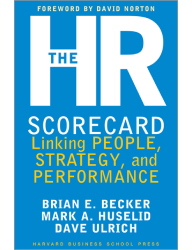
The HR Scorecard: Linking People, Strategy, and Performance
Brian Becker, Mark Huselid & Dave Ulrich
Available here
We’re kicking our list off with an absolute classic. Based on the model of the Balanced Scorecard that was introduced in the mid-1990s, the HR scorecard went on to be transformative across many organizations, articulating how people, strategy and performance could be linked and quantified, and helping organizations create meaningful action plans to deliver results.
While it goes back a couple of decades, the model and book still provide valuable lessons today for tackling the challenges of talking about people issues in clear business language, enabling HR to keep its activity on track by focusing on key performance indicators and expressing its effectiveness in terms of the return on investment.
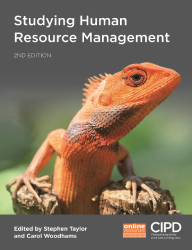
Studying Human Resource Management
Stephen Taylor & Carol Woodhams
Available here
An absolutely essential book for anyone who’s pursuing their CIPD accreditation to level 5. But even if you aren’t, it’s still worth adding to your reading list if you’re looking for a book that explores all of the fundamental concepts within HR, or if you’re studying for other academic qualifications connected to Human Resource Management.
It’s based on a wealth of both academic and practical experience, and also provides many case studies along with signposting various online resources. It is in our view one of the core books for anyone involved in the world of HR.
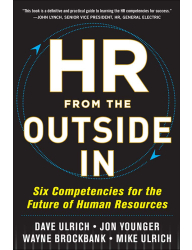
HR from the Outside In: Six Competencies for the Future of Human Resources
Dave Ulrich, Jon Younger, Wayne Brockbank & Mike Ulrich
Available here
If you’re trying to learn more about the key competencies HR needs to have, then this is the book for you. It explores the diverse range of skills needed to enable HR to be at the forefront of building capability, innovating through technology, leading strategically and creating an organization that can embrace change. It doesn’t only discuss the competencies required; it also explores the tensions that can be created between them when trying to reconcile the need to act as advocate for both the business and for employees.
It’s a pragmatic book that clearly focuses on the significance of the HR contribution within the broader business context – a must-read for anyone interested in HR.
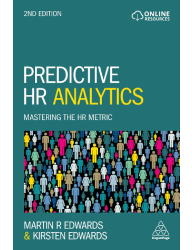
Predictive HR Analytics: Mastering the HR Metric
Kirsten & Martin Edwards
Available here
In an increasingly data-driven world, it’s becoming more and more important that HR is able to take the opportunity to make the most of the potential all this data presents. But they don’t always have the know-how.
This book sets out to address that issue, exploring metrics and analytics in detail and taking a case study-based approach to help the reader understand how they can apply skills in key HR areas such as diversity, recruitment, employee turnover, and employee performance. It gives clear explanations and an accessible framework that helps readers understand how they can analyze and interpret HR data to then support the development of effective and evidence-based HR strategies.
It’s not the easiest subject to get to grips with, and some theory has to be provided which does demand concentration. But it’s all set out in a clear and accessible way that guides the reader through an area that’s becoming an increasingly vital part of effective decision-making and strategy-setting in HR.
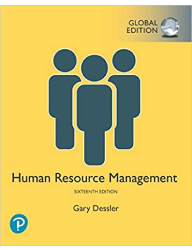
Human Resource Management
Gary Dessler
Available here
If you’re looking for a book that’s going to give you all of the fundamentals of HR, then this is an extremely good place to start. It’s ideal for anyone who wants a straightforward book that covers pretty much all aspects of HR with clear pragmatic step-by-step explanations. It’s about as comprehensive an overview as you can think of, covering subjects like recruitment, placement and talent management, training and development, compensation and employee relations. It also explores the impact that technology has had, and will continue to have, on the way HR works.
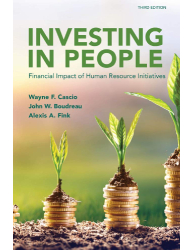
Investing in people: Financial Impact of Human Resource Initiatives
Wayne Cascio, Alexis A. Fink & John W. Boudreau
Available here
This book has been updated a few times but whichever edition you read, you’ll find it really useful for learning more about taking a more strategic approach to HR measurement. It provides a useful framework for taking a logical, structured and analysis-based approach when addressing common HR issues and shows that it is possible to measure activity, challenging the sometimes held belief that HR can be difficult to pin down to any great extent when it comes to its financial impact.
The book initially discusses the foundations of measurement before moving into a more case study-based approach in areas including wellbeing, engagement and absenteeism. As you’d expect, it does have to go into some in-depth technical information to make its points, but it’s all explained in a clear logical way that makes sure it can be easily followed. If you’re looking for a book that helps you develop a more in-depth understanding of strategic HR measurement, then this book is really valuable.
Practical HR books
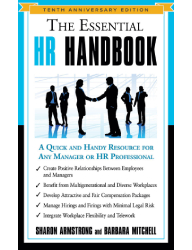
The Essential HR Handbook, 10th Anniversary Edition: A Quick and Handy Resource for Any Manager or HR Professional
Sharon Armstrong & Barbara Mitchell
Available here
The Essential HR Handbook is a really nice guide for anyone who’s looking to understand more about HR at a fairly basic level. It covers a huge range of subjects, including employment law (be aware that it’s USA focused), compensation and benefits and performance management.
It does what it says on the tin; it’s a practical guide rather than the go-to book for cutting edge insights but it’s great for grabbing for a quick check or to refresh on industry best practice. The updated edition reflects many of the changes HR has seen over the past few years and explores issues such as globalization and the use of tech in HR in a useful and practical way.
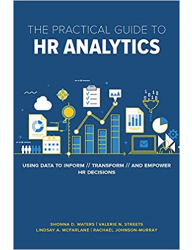
The Practical Guide to HR Analytics: Using Data to Inform, Transform, and Empower HR Decisions
Shonna D. Waters, Valerie N. Streets, Lindsay McFarlane & Rachael Johnson-Murray
Available here
The Practical Guide to HR Analytics is another book that’s designed to help HR understand how to benefit from the increasing volume of data they have access to. It’s a good starter book for anyone looking to learn more about the basics of data analytics, and how to make the most of different types of metrics to take a more evidence-based approach to HR. It discusses effective ways to collect and analyze data by applying various key principles, and then outlines what can be done with that information to shape strategy.
If you want to learn more about how to measure employee value through greater use of data and statistics then this is a very good place to start. It’s impressively jargon-free, with a straightforward layout that helps you to logically absorb the information and understand the problem-solving potential at different levels of complexity depending on what you need.
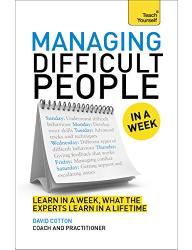
Managing Difficult People in a Week
David Cotton
Available here
It’s more or less a given that if you are working in HR, there will be times when you find yourself dealing with people who are behaving in a challenging way. And while you might feel like you should have the answers to deal with all those situations, sometimes we all need a bit of support and guidance in thinking through how best to handle it. This book is a short and straightforward read, split into clear and easy-to-read chapters that offer tips and pointers on how best to deal with difficult people and resolve conflicts that have arisen. The advice isn’t hugely groundbreaking but when you’re caught up in a complex situation it can be a valuable prompt that helps you gather your thoughts and work out a strategy to deal with it.
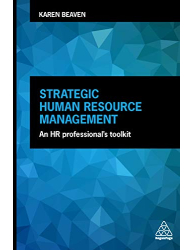
Strategic Human Resource Management: An HR Professional’s Toolkit
Karen Beaven
Available here
Strategic Human Resource Management is a very practical guide for anyone involved in HR who wants to learn how to add more strategic value through a greater understanding of themselves, their organization and industry, and the HR profession itself. The focus isn’t just on understanding the technicalities of HR, but also on making sure readers are thinking about the dynamic with factors like wellbeing (including their own), and what they can do to create a more valuable people experience.
It’s a very accessible read that provides plenty of practical steps people can apply in their roles straight away. More seasoned practitioners might already know quite a bit of it already but there’s a nice blend of content that should have something for everyone.
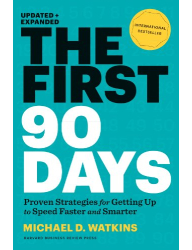
The First 90 Days: Proven Strategies for Getting Up to Speed Faster and Smarter
M. D. Watkins
Available here
Is there a skill to starting a new role? Almost certainly, and The First 90 Days has proved invaluable to many people moving into leadership roles and seeking guidance on how to make that transition as effectively as possible.
The book’s designed to help readers diagnose the core challenges they face, then create a plan to ensure a smooth and comfortable transition by taking steps including boundary setting, building alliances and securing some early wins. It advises on how to strike the balance in the early days between the need to make things happen and the need to observe, reflect and learn. This international bestseller has been updated and expanded upon and is a comprehensive guide to anyone starting a new role and on the subject of transitions in general. Highly recommended.
HR books on leadership
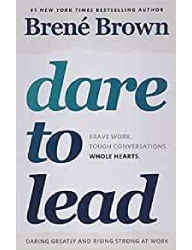
Dare to Lead
Brené Brown
Available here
New York Times bestselling author and recipient of The Huffington Foundation endowed chair at the University of Houston, Brené Brown has spent over two decades researching the fields of courage, vulnerability, shame and empathy. In this book, she draws together her research to tackle one of the most important questions of all in an organization: how do you go about becoming a better leader?
If you’re looking for answers to that question, this is a fascinating read. The book points to the importance of great leaders not focusing on status or titles but instead understanding that empathy, connection and courage are of far greater value, and making that philosophy the foundation of how they lead. This book invites you to reappraise the concept of leadership – it’s an excellent read.
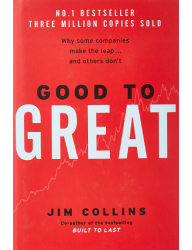
Good to Great: Why Some Companies Make the Leap… And Others Don’t
Jim Collins
Available here
Essential reading for anyone interested in organizational leadership. Based on extensive research, Good to Great sets out to discover what it is that prevents some organizations from making the leap to great while others manage to take that step. The author describes a number of common themes and traits identified in companies that have turned out to be significant contributors to improving their performance – including servant leadership models and choosing the right people before aligning the strategy.
The book also shares many examples of where things didn’t go to plan, helping readers to be aware of potential pitfalls and reflect on how they can be avoided. It’s a concise, enjoyable read that challenges some commonly held perceptions and is helpful to anyone thinking about elevating their organization’s performance.
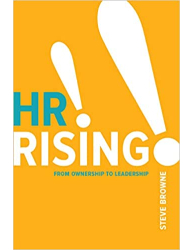
HR Rising!!: From Ownership to Leadership
Steve Browne
Available here
HR can sometimes be viewed as a fairly transactional function, a source of useful support and advice but not much more beyond that. Yet its potential is immense. The HR profession has the ability to be a global force that brings about meaningful change. That’s just one of the inspiring messages contained in this book.
HR Rising focuses on how HR can transcend the mindset of its transactional role, and instead use its unique position as the function that connects with all employees to consciously embrace and fulfil its leadership role. It might sound like aspirational stuff, but the book is very focused on what is possible right here, right now with its exploration of characteristics that enable immediate and effective leadership behaviors that result in highly engaged workforces. And it’s real-world stories help bring it to life even more, making it a read that you’ll devour very, very quickly.
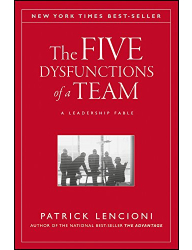
The Five Dysfunctions of a Team: A Leadership Fable
Patrick Lencioni
Available here
Now this is a really engaging book for anyone who loves a storytelling approach that’s easy relatable no matter what size of company or type of sector you’re operating in.
This New York times bestseller tells the tale of Kathryn Petersen, Decision Tech’s CEO. And she’s facing the ultimate leadership crisis – so what should she do? The fable illustrates the five major dysfunctions which explain why even seemingly strong teams can find themselves floundering. There are no prizes for working out that ultimately she does manage to turn things around but it’s a fascinating and insightful book that really scrutinizes what it takes to lead effectively. It’s hugely entertaining but also provides the reader with powerful insights into steps that can be taken to build both effective team leaders and teams.
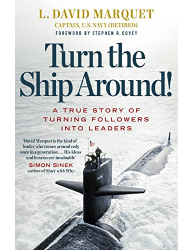
Turn the Ship Around!: A True Story of Building Leaders by Breaking the Rules
L. David Marquet
Available here
If true stories are more your thing then you should definitely include this one on your reading list. L. David Marquet commanded the nuclear-powered submarine USS Santa Fe and has since gone on to become a Wall Street Journal Best Selling Author thanks to his experiences in the US Submarine Force. And this true story explains how he managed to achieve meaningful change, transforming a jaded and disengaged crew into a focused and highly motivated team.
His philosophy is this: Leadership should mean giving, not taking, control. It’s a candid book, acknowledging the struggle of having a vision but not the means to achieve change initially, before going on to learn from those failures and work out what needs to be done. There’s plenty here to inspire you to take another look at the practices in your company and think about what you can do to transform leadership for greater engagement.
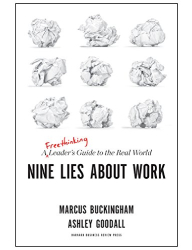
Nine Lies About Work: A Freethinking Leader’s Guide to the Real World
Marcus Buckingham & Ashley Goodall
Available here
We’ll bet that you’re as intrigued by the title of this book as we were and if you’re expecting it to be a provocative read you won’t be disappointed. There’s a fundamental problem say the authors – distorted assumptions have crept into the working environment, and they are sabotaging efforts to make it a better place and affecting organizations’ chances of success.
For example, do you believe that millennials are a generation that need feedback? That’s something many oorganizations think, and they are adapting their approaches accordingly. But it’s not true say the authors. They don’t want constant feedback; they want helpful attention and it’s not the same thing.
Nine Lies About Work is a hugely engaging easy read. Yes it’s a bit controversial but it’s a very thought-provoking book – don’t be surprised if you find yourself agreeing with a least a few of the points they are making…

Radical Candor: Be a Kickass Boss without Losing Your Humanity
Kim Scott
Available here
You’re probably familiar with the expression if you don’t have anything nice to say, don’t say anything at all. Yet while that might work in some contexts, this book argues such as approach can spell disaster when it’s the prevalent managerial philosophy. Kim Scott is a former leader at Google who then went on to work for Apple and she’s a firm believer that companies need to adopt what she terms “Radical Candor” – in other words, the ability to be honest without being brutal.
Candor sometimes has connotations of being harsh but as the book explains, that isn’t what it’s about. It enables a transparent and open leadership approach that also avoids someone being taken advantage of or regarded as a pushover; leaders don’t need to sacrifice kindness in order to be seen as strong and effective. Aggression sits at one end of the spectrum and excessive empathy at the other – this intriguing book talks about how to find the sweet spot in the middle.
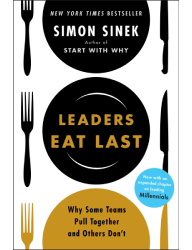
Leaders Eat Last: Why Some Teams Pull Together and Others Don’t
Simon Sinek
Available here
You’ll probably have heard the name Simon Sinek: he’s a regular TED talk motivational speaker and he’s also a bestselling author of several great books. In this book he challenges leaders to put employees first, prioritizing supporting and serving those who they lead. He talks about many successful companies and organizations that have done this with powerful consequences, creating cultures where employees feel trusted by their leaders and inspired to do their best work.
The book’s illustrated with many examples of innovative leadership practices that are motivated by the desire to advance the interests of the organization, rather than for recognition from those above. Lots of interesting concepts and explanations make this an enjoyable and insightful read.
HR books on talent
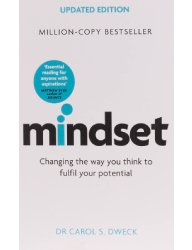
Mindset: Changing The Way You think To Fulfil Your Potential
Carol Dweck
Available here
If you haven’t previously come across Stanford University psychologist Carol Dweck you’re missing out. She’s carried out decades of research into the phenomenal influence and power of mindset in both employees’ personal and professional lives. Dweck’s research has led her to identify two distinct mindsets that have the potential to limit beliefs or enable success: the fixed mindset and the growth mindset.
People with fixed mindsets believe their qualities and abilities are set and that they’re only capable of doing things well if they have a natural aptitude for them. They don’t seek to learn from mistakes, and feedback can often be perceived as criticism. If they ‘fail’ at something, they’ll make excuses rather than learn from the experience. Someone with a growth mindset however believes their abilities can develop through hard work. They haven’t failed to achieve something; they simply haven’t achieved it yet. Everyone can change and grow through learning, effort and experience.
This book takes you on a journey to understand the differences between these mindsets and how this knowledge can be transformational both personally and at every level throughout your organization.
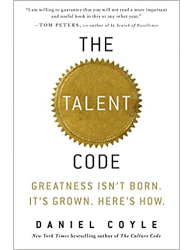
The Talent Code: Greatness Isn’t Born. It’s Grown
Daniel Coyle
Available here
As a New York Times best-selling author, there are actually quite a few of Daniel Coyle’s books that could have made this list. But we particularly love this one for the way it demystifies the sometimes rather vague concept of ‘talent’ and instead gives organizations real clarity about what they can do to nurture it in their workplace.
Much like Carol Dweck, Coyle embraces the belief that talent isn’t something that’s inherited and that you automatically have or haven’t got. Instead, it’s something that can be developed. There are many interesting neuroscientific insights in this book and the core belief – that we can all reach new heights through retraining the brain and making good choices about the way we learn – is a really upbeat message.
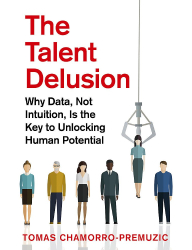
The Talent Delusion: Why Data, Not Intuition, Is the Key to Unlocking Human Potential
Tomas Chamorro-Premuzic
Available here
The Talent Delusion explores approaches to discovering, understanding and nurturing talent for the best results within an organization, making the case for why “intuition” about talent is pretty useless.
Instead, it takes a fact-lead approach, arguing that psychology needs to underpin talent management. Companies need to move away from being budget-led (the book mentions salient stats including the fact that confidence in leadership doesn’t correlate with rising leadership development spend) and the need to redefine what it means for an employee to work at their maximum capability. Often, it’s mistakenly perceived to be the case when an employee’s giving it ‘their all’ but actually, that doesn’t mean they’re performing at their peak. It’s also important to recognize that it’s difficult to sustain peak performance if it’s not an employee’s normal level of performance. This book explores how oorganizations can close that gap. Lots of intriguing material here for people development.
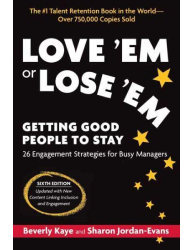
Love ‘Em or Lose ‘Em: Getting Good People to Stay
Beverly L. Kaye & Sharon Jordan-Evans
Available here
Love ‘em or lose ‘em is another book that provides useful insights about retaining key talent, stressing that holding onto people isn’t simply about the quality of the remuneration package and perks that are on offer. The authors share their combined expertise to explain what companies can do to create more supportive environments that provide challenging and meaningful work which will encourage top performers to stay.
The book is written in an easy-to-follow way, based on an A-to-Z format that makes the 26 strategies listed particularly memorable and helps with generating fresh ideas to engage and retain people. The latest edition has been updated to reflect the growing recognition of the importance of diversity and inclusion too.
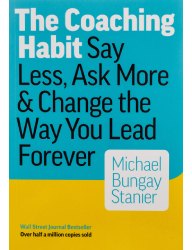
The Coaching Habit: Say Less, Ask More & Change the Way You Lead Forever
Michael Bungay Stanier
Available here
Michael Bungay Stanier has a level of experience in the coaching world that’s almost unparalleled. So when he writes a book that distills his knowledge into seven essential questions that you should ask as part of the coaching process, you can have confidence that he really knows what he’s talking about.
It’s a light-hearted read but the information it imparts has the potential to be transformative. Each of the seven questions are broken down, guiding the reader to understand the very practical steps they can take to ask great questions that help their coachee find the answers. Coaching books can often be on the dry side but this one keeps you hooked from the very first page.
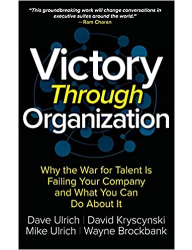
Victory Through Organization: Why the War for Talent is Failing Your Company and what You Can Do About It
Dave Ulrich, David Kryscynski, Wayne Brockbank & Mike Ulrich
Available here
In the era of what’s become known as The Great Resignation with companies struggling to get the skill they need, this is a book that’s well worth a read. Its premise is that it’s not so much about the talent that you attract but what you go on to do with it. The book is research-based, exploring the insights of the HR Competency Survey from a staggering sample size of over 32,000 HR professionals, business leaders and associates coupled with extensive previous research carried out by the authors.
It offers practical advice for better building capabilities and empowering employees to achieve greater levels of success. Rather than HR carrying out more isolated activities, like managing employees’ progress through the organization, the focus should pivot to closely aligning them with organizational needs using what the authors call the ‘logic of organizational capability’. The focus should also be on creating value not only to employees, HR and the business, but to other stakeholders, like investors and communities too. It’s a great book that can inspire real change.
Miscellaneous but highly thought-provoking reads!
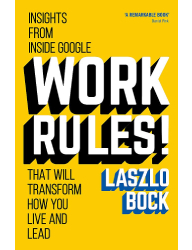
Work Rules! Insights from Google that will transform how you live and lead
Laszlo Bock
Available here
That’s quite a big claim for a subheading to make. But in fairness, Google isn’t exactly known for underachieving. And if anyone’s in a position to speak with authority on this subject, it’s Laszlo Bock, Google’s Senior Vice President of its People Operations division from 2006 to 2016.
It’s a company that’s well known for its exceptional HR practices and culture – and this book gives plenty of insights into how it’s developed them over the years. But it’s not written to simply showcase Google’s brilliance, it’s written to help the reader understand what they can do in their own organization to improve people management. Obviously, Google’s philosophy has paid dividends, demonstrating the impact of a company that genuinely puts employee wellbeing at its heart. But it’s also an honest account that acknowledges not everything was plain sailing – Bock readily holds his hand up to things that went wrong and lessons learned along the way.
Key takeaways for us? Culture is key. Don’t underestimate the importance of data in HR. If your people are worthy of trust, you must be transparent with them and give them honest and fair feedback in a sensitive way. And learning to learn from failure is a major part of being successful.
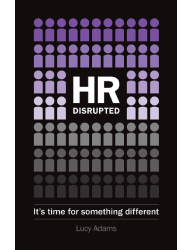
HR Disrupted: It’s Time for Something Different
Lucy Adams
Available here
Has HR lost its way? Is it time for something different? Depending on what you think, this book might or might not be radical enough in its suggestions, but it certainly casts a critical eye over some HR processes that might be coming to the end of their shelf life. It also raises interesting questions about what the future of HR is likely to look like.
Adams stresses the need to treat employees as adults, consumers, and human beings. She draws on a range of interesting examples from her time as the BBC’s HR Director and also highlights some views from thought leaders including Simon Sinek and Daniel Pink. While it might not be quite as revolutionary as the title suggests, or as authoritative as the likes of ‘Work Rules’ (see no. 26), it’s still an excellent read for the HR practitioner who’s thinking about how to manage people in what is undoubtedly a world that’s changing at speed.
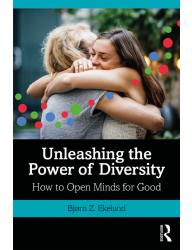
Unleashing the Power of Diversity: How to Open Minds for Good
Bjørn Z. Ekelund
Available here
Most people involved in HR understand the importance of diversity, but knowing how to harness its potential power has proved to be challenging. How can the challenge of different mindsets, perspectives and cultural backgrounds be managed in such a way that they become beneficial instead?
Ekelund uses his knowledge as the creator of the training and development program Diversity Icebreaker to share an approach to breaking down barriers and improving communication between employees across many different cultures. The step-by-step approach explores how best to reinforce positive identities and build trust sustainably and authentically. It’s a comprehensive toolkit that provides plenty of ideas and advice for communicating with people in a unifying way.

The Culture Map: Breaking Through the Invisible Boundaries of Global Business
Erin Meyer
Available here
If the theme of creating success in multicultural organizations interests you, INSEAD professor Erin Meyer’s book ‘The Culture Map’ is well worth a read too.
The book takes the reader through an eight-scale framework that explores each of the key areas managers need to be mindful of in order to harness the power of a diverse company: communicating, evaluating, persuading, leading, deciding, trusting, disagreeing and scheduling. By using this framework to understand the cultural differences in these scales, managers can identify the barriers in place in their organization and work out how best to break them down. The book’s tone is kept accessible thanks to its easy-to-read style that has many examples drawn from the author’s experiences.
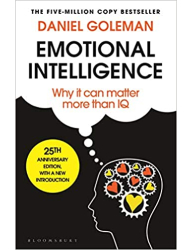
Emotional Intelligence
Daniel Goleman
Available here
Award-winning psychologist and science journalist Goleman is one of the top thought leaders in the field of Emotional Intelligence. Even though this book has been out for more than 25 years, its insights are being increasingly recognized as a fundamental part of business success with EI being regularly touted as one of the most important traits to succeed in business today – even more important than IQ.
In Emotional Intelligence, Goleman discusses how EI relates to how you manage yourself and your relationships with other people. Some people are naturally high on emotional intelligence but for those to whom it doesn’t come so readily there are many ways it can be developed. Given its potentially beneficial application in organizational development, this subject is something many people in HR might want to learn more about and this book is the perfect starting point.

Belonging at Work: Everyday Actions You Can Take to Cultivate an Inclusive Organization
Rhodes Perry
Available here
Feeling like you belong is a basic human need. And as this book discusses it’s hugely important in the workplace. Employees who truly feel like they belong feel part of the team. They feel empowered and included and that sense of inclusion should be a fundamental goal of organizations everywhere.
Belonging At Work explores how environments can be developed to ensure employees feel safe (you can learn more about psychological safety in book number 33 on our list), accepted, respected and valued. It draws together the concepts of diversity, equity, and inclusion, explaining how they should work together. It takes a conscious choice by companies – in the author’s words, cultivating a workplace culture of belonging is a journey, not a destination. It takes patience, perseverance, tenacity and grit. With a blend of case studies, practical strategies, and personal experiences, this book’s a really useful read for anyone thinking about taking positive action to increase the sense of belonging in their workplace.
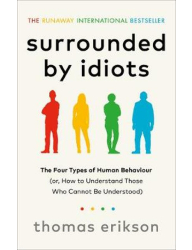
Surrounded by Idiots: The Four Types of Human Behavior and How to Effectively Communicate with Each in Business
Thomas Erikson
Available here
Okay, the title isn’t exactly subtle. And we’re sure it’s not a phrase you’ve ever use about the people you work with… but most of us would probably admit that we’ve experienced frustrations from time to time with at least one or two colleagues.
Yet what’s actually going on could stem from a communication breakdown. By understanding the four key behavior types that Erikson explains define how we interact with and perceive the people around us, this book helps us understand how communication can be improved by changing patterns of behavior. It’s an entertaining and interesting read that can be useful for understanding how to improve team dynamics and reduce the potential for conflict.

The Fearless Organization: Creating Psychological Safety in the Workplace for Learning, Innovation, and Growth
Amy C. Edmondson
Available here
Amy C. Edmondson is the Novartis Professor of Leadership and Management at the Harvard Business School and a leading name in the field of psychological safety. Psychological safety refers to environments and cultures where employees feel able to be themselves and speak up without fear of embarrassment. The Fearless Organization provides a step-by-step framework for any organization that wants a culture where employees feel able to contribute their thoughts, and ideas can thrive.
Based on many years of research, Edmondson explains the links between a climate of psychological safety and strong company performance. The book explores how employees can be empowered to be their whole self at work, feeling able to take creative risks and innovate and collaborate, free from the boundaries that fear imposes. A great read for anyone keen to create a supportive culture where people feel able to express themselves fully.
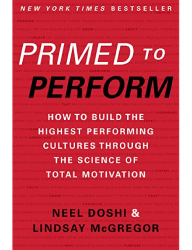
Primed to Perform: How to Build the Highest Performing Cultures Through the Science of Total Motivation
Lindsay McGregor & Neel Doshi
Available here
Vega Factor co-founders Lindsay McGregor and Neel Doshi bring together their expertise in this book to explain what companies can do to build high-performance cultures.
It takes a careful look at what it calls the science of total motivation, tapping into psychology as an essential tool for enabling greater innovation by unlocking employees’ ability to experiment and adapt. The book looks at how to measure motivation and cultural strength and track improvements over time and has plenty of interesting insights into some well-known companies and the approaches they have taken to develop their cultures. Worth a read if you’re thinking about how you can move your organization’s culture forward.
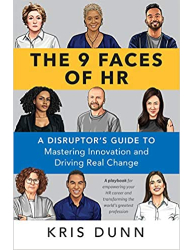
The 9 Faces of HR: A Disruptor’s Guide to Mastering Innovation and Driving Real Change
Kris Dunn
Available here
9 Faces is rather a departure from some of the approaches you tend to encounter in books designed to encourage HR to reflect on their own personas. In this easily relatable book, HR speaker and CHRO Kris Dunn identifies nine core HR personalities as differentiated by career level, attitude towards innovation, and capacity for influencing change.
It’s brilliant for raising self-awareness in a non-judgemental way. The book doesn’t suggest one persona is better than another: instead, it examines the weaknesses and strengths of each, helping the reader reflect on their own approach and preferences and driving traits, and then come up with steps to address any areas they’d like to work on. It’s great for anyone at any stage of their HR career to use to guide their own journey.
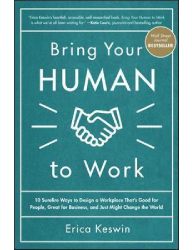
Bring Your Human to Work: 10 Surefire Ways to Design a Workplace That Is Good for People, Great for Business, and Just Might Change the World
Erica Keswin
Available here
Forbes, Harvard Business Review and Entrepreneur contributor Erica Keswin’s book is a really well-researched how-to manual for cultivating human relationships in the workplace. The philosophy of the book is that it doesn’t matter how strong someone’s technical skills are if they cannot manage relationships well.
The book explores strategies for improving company culture through connecting in meaningful ways with others and enhancing employee wellbeing, facilitated by techniques such as holding purposeful meetings, acting with authenticity and intention and using technology strategically to help sustain strong relationships.
It’s full of real-life examples of both business leaders and organizations who have prioritised cultivating and nurturing more humanity and a greater emphasis on employee wellbeing both in and outside the workplace – with a transformative impact.
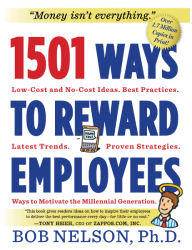
1501 Ways to Reward Employees: Low-Cost and No-Cost Ideas
Bob Nelson
Available here
1501 Ways to Reward Employees is a collection of some very different approaches to inspire employees, recognize their ideas and express appreciation.
The book covers the basics around why employee recognition’s important and various reward strategies, along with a selection of case studies that illustrate how particular types of motivation programs work in practice. It also provides a staggering number of ideas about what you could try in your organization. Some of the ideas you’ll probably love. Some might seem irrelevant. And some might seem downright crazy. But this book gets you thinking and it’s a brilliant reminder that very often the best ways to reward employees do not demand a whacking great budget – just some thought and awareness that different people will appreciate different things.
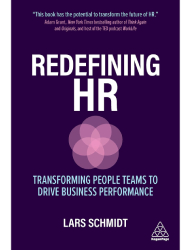
Redefining HR: Transforming People Teams to Drive Business Performance
Lars Schmidt
Available here
Wharton School professor Adam Grant’s described this book as having the potential to transform the future of HR. Which is probably a good enough reason on its own to include it on this list! But read on if you’d like a few more.
Lars Schmidt is founder of boutique agency, HR leader development platform and community Amplify and has over 20 years’ experience driving HR innovation. Redefining HR covers the evolution of Human Resources and People Operations but manages to cut through what is a huge subject area and focus on the salient points in a really intriguing way. It’s a book that will appeal to both HR and non-HR people, outlining some of the challenges experienced by HR teams and bringing with it a real-world pragmatism (and plenty of real-life examples) to coming up with solutions. It’s an honest and sometimes vulnerable account of what it takes to lead HR in a more progressive way and it’s an inspiring book in terms of where the function is heading.
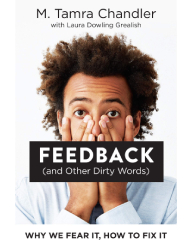
Feedback (and Other Dirty Words): Why We Fear It, How to Fix It
M. Tamra Chandler & Laura Dowling Grealish
Available here
This book explores why feedback can often have such negative associations, seen as something that’s necessary to ‘correct’ behaviors and address shortcomings. And yet its potential to transform performance, at an individual level and right up to organizational level, is immense. It can be used to build trust and improve collaboration. As the book says, if employees are being wounded by feedback experiences, then it’s being done wrong as a culture. Feedback should be something to run towards, not away from.
The book strongly endorses the principles of the positive mindset (it refers to Carol Dweck’s work – book number 20 on our list) and the willingness to use feedback as a tool for improvement. There are plenty of actionable strategies here, with advice about how to improve feedback and tailor it to suit different circumstances.

Have you got a minute?
E Harvey & J Field
Available here
We couldn’t resist including this one as the final one on our list. Because, as we all know, when you’re in HR it helps to have a good sense of humor. And this is such an entertaining read – after all, can there be a single HR person who hasn’t been asked ‘Have you got a minute?’ on a regular basis during their career? Or used the phrase as an opener to initiate what’s about to turn into quite a challenging conversation…
While the book is fictitious it cleverly reflects many of the situations that HR people can find themselves in – sometimes funny but sometimes emotional and sad too. It’s a very witty and engaging read – so if you’re looking for something a bit different then we’d suggest you check this one out.
Read more: 32 must-listen HR podcasts
There are many other HR books we could have included on this list – but hopefully you’ll find at least a few titles here that capture your imagination and develop your knowledge about the world of HR. We hope we’ve inspired you to pick up a book and enjoy the insights they have to offer.
Happy reading!


 30 ideas to help a new starter in their first week
30 ideas to help a new starter in their first week
 The value of external feedback in the workplace
The value of external feedback in the workplace
 Expand the power of recognition with Partner Appreciation
Expand the power of recognition with Partner Appreciation